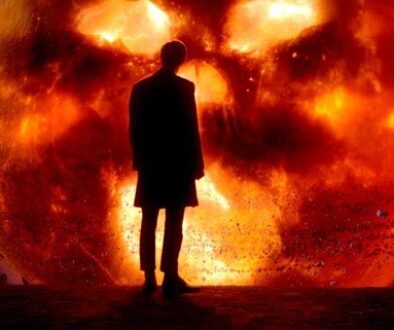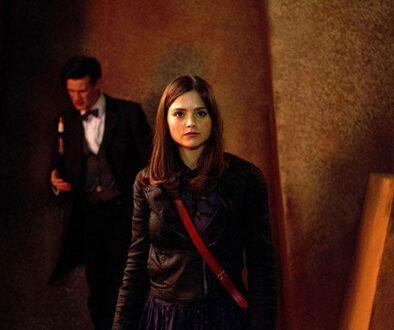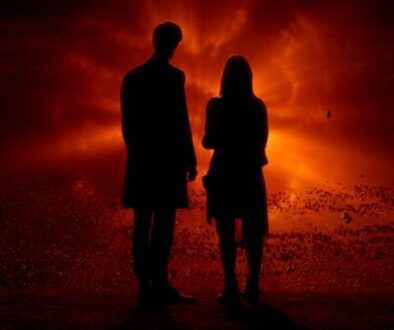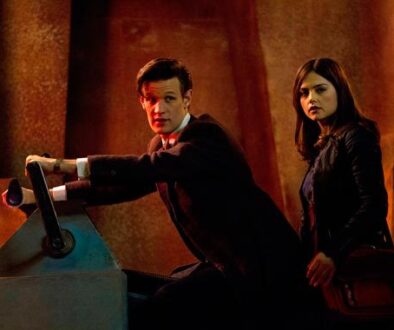2nd Opinion: The Rings of Akhaten
John Hussey and Adam James Cuthbert each give their own verdict on Neil Cross’ episode.
John’s verdict
As Series 7: Part 2 progresses, we see the development of Clara Oswin Oswald and her mysteries along with the ever-nearing build-up to the 50th Anniversary. Newbie Who writer Neil Cross certainly did a brilliant job at attracting my attention as he delivered a brilliant first script.

Well at least we didn’t have to wait long for one of Clara’s mysteries; I speak of course about the leaf, i.e. page one of her book ‘101 Places to See’. It was an interesting idea having the leaf meaning the beginning of her life. It makes it seem even more significant to Clara than I original thought. It has purpose and values by having it being the leaf that brought her parents together in the first place. It’s also given us an interesting little delve into Clara’s past, making us have to think harder about her mystery. If she is a normal little girl who was born through normal parents, then how can she possibly be living another two lives in two different times? Perhaps the leaf means more than what meets the eye. I mean, it does seem like destiny that leaf flying into her father’s face like that.
 This week’s episode had a massive function: introduce the new companion to the world of the Doctor. Clara briefly got an understanding of this in ‘The Bells of Saint John’ but now it was time for her to take on the reigns for a full-on journey in the TARDIS. The Doctor takes her to the Rings of Akhaten, a completely alien world far away from the life she knows back on Earth. It is always interesting taking a companion to an alien world on their first go as it really gives them an understanding of the Doctor’s life. Travelling back in time is fun, but the companion will already be aware of their planet’s history and the mystery of the TARDIS fades slightly. Clara certainly reacted well and was excited and amazed at the alien market and all the different creatures surrounding her.
This week’s episode had a massive function: introduce the new companion to the world of the Doctor. Clara briefly got an understanding of this in ‘The Bells of Saint John’ but now it was time for her to take on the reigns for a full-on journey in the TARDIS. The Doctor takes her to the Rings of Akhaten, a completely alien world far away from the life she knows back on Earth. It is always interesting taking a companion to an alien world on their first go as it really gives them an understanding of the Doctor’s life. Travelling back in time is fun, but the companion will already be aware of their planet’s history and the mystery of the TARDIS fades slightly. Clara certainly reacted well and was excited and amazed at the alien market and all the different creatures surrounding her.
Clara also got the chance to delve into the adventure on her own for a bit, which was an interesting idea, especially with it being her first outing. Clara bumped into Merry Gejelh, the Queen of Years, and uses her mothering side to persuade her into completing her task. We know from past Clara in ‘The Snowmen’ that she is kind and sentimental when it comes to children as is present-day Clara. This side of her really showed off her character’s emotional sides and really gave her heart and wisdom. We also see that she cares about Merry, especially when she is being abducted by the Mummy and blames herself because she convinced her to perform the song. We also see her begin to show more respect and care for the Doctor, as she decided to return and help him fight the Old God. Another interesting part of the story was when the TARDIS refused to allow Clara entry; a twist which helps furthers her mystery and the fact she is a walking anomaly.
 The Doctor, as always, had a few crowning moments that gave spark to the episode. Firstly his curiosity for Clara’s mystery stemmed even further, now having met present-day Clara, and deciding to visit her past and discover about her early life and becoming confused at the findings. She had parents and a normal life but how on earth could she live in two other times with two other lives? As promised at the end of ‘The Bells of Saint John’, the Doctor returned for Clara the following day at 7:00pm and asked her where she wanted to go, with her answer being, “Somewhere awesome.” The Doctor also gave off a nice piece of nostalgia by revealing he had been to Ahkaten before with his granddaughter, i.e. Susan Foreman. This was a nice little reference to the past and certainly helps with the build-up to the 50th Anniversary.
The Doctor, as always, had a few crowning moments that gave spark to the episode. Firstly his curiosity for Clara’s mystery stemmed even further, now having met present-day Clara, and deciding to visit her past and discover about her early life and becoming confused at the findings. She had parents and a normal life but how on earth could she live in two other times with two other lives? As promised at the end of ‘The Bells of Saint John’, the Doctor returned for Clara the following day at 7:00pm and asked her where she wanted to go, with her answer being, “Somewhere awesome.” The Doctor also gave off a nice piece of nostalgia by revealing he had been to Ahkaten before with his granddaughter, i.e. Susan Foreman. This was a nice little reference to the past and certainly helps with the build-up to the 50th Anniversary.
We also see the Doctor returning to his old ways, with the simple statement of, “We don’t walk away.” In the first half of the series, we witnessed the Doctor trying to erase himself from existence, but now he is coming back into the light – being once again the hero wondering in eternity. Also I loved his speech he gave to the Old God. That was the highlight of the story. It really demonstrated he willingness to save the universe and put his life on the line. We also got another piece of nostalgia put in with the mentioning of the Time War and the fall of the Time Lords. This is something we don’t hear Eleven mention much but it is always a treat to see it, especially since it is an emotional subject for him. By the share fact this speech caused him to cry really showcases his loneliness and how he perceives himself. Deep down he curses his life and the judgements he’s made. He isn’t a saint, and the Doctor knows that. Finally we get the re-mentioning of the Doctor’s greatest secret; something the Doctor must never ever say to anybody else. What can this information be I wonder? Whatever it is, it can’t be anything good. All shall be revealed soon according to Steven Moffat.
The episode as a whole was very interesting and unique. To me, it felt very Classic Who. The Doctor taking his companion to a faraway place filled with new things. This is my idea of a good episode, were the Doctor travels to alien worlds and meets new mythologies and environments. The whole environment gave off a very ‘Star Wars’ feel to me and I think having the alien market place really does give the adventure, and the show itself, more depth and allows to expand the Whoniverse and the potential of the storytelling. The whole idea of singing a long lullaby which tells a story to appease the God of Akhaten is a brilliant idea. I must admit I was worried about it after reading about it beforehand but after watching it in the episode I felt it worked and flowed with the story in a magical way. It gave the episode more depth and really emphasised the alien nature of the plot and environment. The story wasn’t on Earth, it was within the Rings of Akhaten and this is their mythology and way of life.
 The villains of the piece were interesting as well. It gave the story layers of unravelling as we slowly got to discover what was really going on. At first it is thought Grandfather, i.e. the Mummy in the glass cage, was in fact the villain of the piece along with its sinister henchmen the Vigils. This worked in my eyes. Again I was worried these said creatures were going to be undeveloped and lacking screen time but in fact it worked with the flow of the episode. They got enough time to do their part and helped push along the next stage of disaster. The designs for both the Vigil and the Mummy were incredible and certainly gave them a realistic depth filled with scare values. They were certainly threatening and proved as deadly obstacles for the Doctor and Clara to face. In a turn of events, the Old God is revealed to be the planet itself – a twist that gives the episode even more danger than first thought. The creatures don’t speak but I think for this episode it works. They have no need for speech; the characters around them along with their evil intentions speak for themselves. The Old God was a deadly parasite who wished nothing but to steal the souls of those around them to fill its wicked heart of loneliness and hate, proving to be a mighty opponent for the Doctor.
The villains of the piece were interesting as well. It gave the story layers of unravelling as we slowly got to discover what was really going on. At first it is thought Grandfather, i.e. the Mummy in the glass cage, was in fact the villain of the piece along with its sinister henchmen the Vigils. This worked in my eyes. Again I was worried these said creatures were going to be undeveloped and lacking screen time but in fact it worked with the flow of the episode. They got enough time to do their part and helped push along the next stage of disaster. The designs for both the Vigil and the Mummy were incredible and certainly gave them a realistic depth filled with scare values. They were certainly threatening and proved as deadly obstacles for the Doctor and Clara to face. In a turn of events, the Old God is revealed to be the planet itself – a twist that gives the episode even more danger than first thought. The creatures don’t speak but I think for this episode it works. They have no need for speech; the characters around them along with their evil intentions speak for themselves. The Old God was a deadly parasite who wished nothing but to steal the souls of those around them to fill its wicked heart of loneliness and hate, proving to be a mighty opponent for the Doctor.
Apart from the abrupt ending, i.e. no goodbye scene to Merry and the aliens, or explanations of how they survive without a planet to orbit, and of course Clara returning home afterwards – which I hope doesn’t become a reoccurring theme – ‘The Rings of Akhaten’ was a brilliant episode. I can’t wait to see what Neil Cross brings to the table with his second script ‘Hide’ in a couple of weeks time.
And now we build-up to the long awaited return of the Ice Warriors in ‘Cold War’.
Adam’s verdict
 Ezra Pound famously said: “Make it new!” A similar sentiment would appear to be the mantra of this series. Until now, I’ve been little persuaded of the virtues of a ‘bigger and bolder’ Doctor Who than ever before. The majority of the episodes have felt lacklustre and rushed, emphasising style over substance. So it’s to my surprise and pleasure that Neil Cross has contributed a story that successfully balances this series’ earnest endeavours to pitch grandiosity of scale and ambition with an undercurrent of heart-warming drama. The result is a multifaceted narrative concerned with examining human psychological experiences, whilst investing the alien civilisation with a rare sense of culture.
Ezra Pound famously said: “Make it new!” A similar sentiment would appear to be the mantra of this series. Until now, I’ve been little persuaded of the virtues of a ‘bigger and bolder’ Doctor Who than ever before. The majority of the episodes have felt lacklustre and rushed, emphasising style over substance. So it’s to my surprise and pleasure that Neil Cross has contributed a story that successfully balances this series’ earnest endeavours to pitch grandiosity of scale and ambition with an undercurrent of heart-warming drama. The result is a multifaceted narrative concerned with examining human psychological experiences, whilst investing the alien civilisation with a rare sense of culture.
This culture is focalised through Clara’s point-of-view – her memories, personality, and sense of personal history. This aids to invest the audience, emotionally, within the character, grounding her independent stature. We learn about who Merry is – not merely as the living repository for the wealth of cultural knowledge – but as a young girl, afraid of growing-up, through Clara’s inquisitions and compassion. I’m piqued by notions of subjectivity and interpretation, so The Rings of Akhaten, to me, resonates on a deeper, intimate level about everyday human types of experience – the source of the finest drama, as that’s where the casual audience will identify. Clara acquires Merry’s trust by relating her own experience of being afraid: “Blackpool beach, bank holiday Monday. About ten billion people.” Cross subtly recognises this is how the world would be construed through a child’s eyes, and develops the dialogue to his advantage. This fleshes out the dimensions of Clara’s character, as an empathic individual, who derives inner strength and confidence from the memory of her beloved mother.
The counteract to the story’s more localised drama, of course, is the Doctor’s confrontation with an adversary on a Godlike scale: Akhaten itself, in actuality a colossal parasite that ravenously feasts on the memories and stories of its people. Such an adversary relies on the Doctor’s ingenuity for oration (“I’ve seen things you wouldn’t believe”) rather than scientific know-how and tech-savvy to thwart – accentuating the story’s philosophical nature. As a whole, The Rings of Akhaten may be thin on plot, but it’s enriching in characterisation, atmosphere, and drama, giving visible signs this series’ stylistic direction can be a boon (the direction appears to allude to Blade Runner at one point, with a close-up on Clara’s eye reflecting the Hell/Hades landscape of Akhaten).
[You can read Adam’s full verdict here.]







